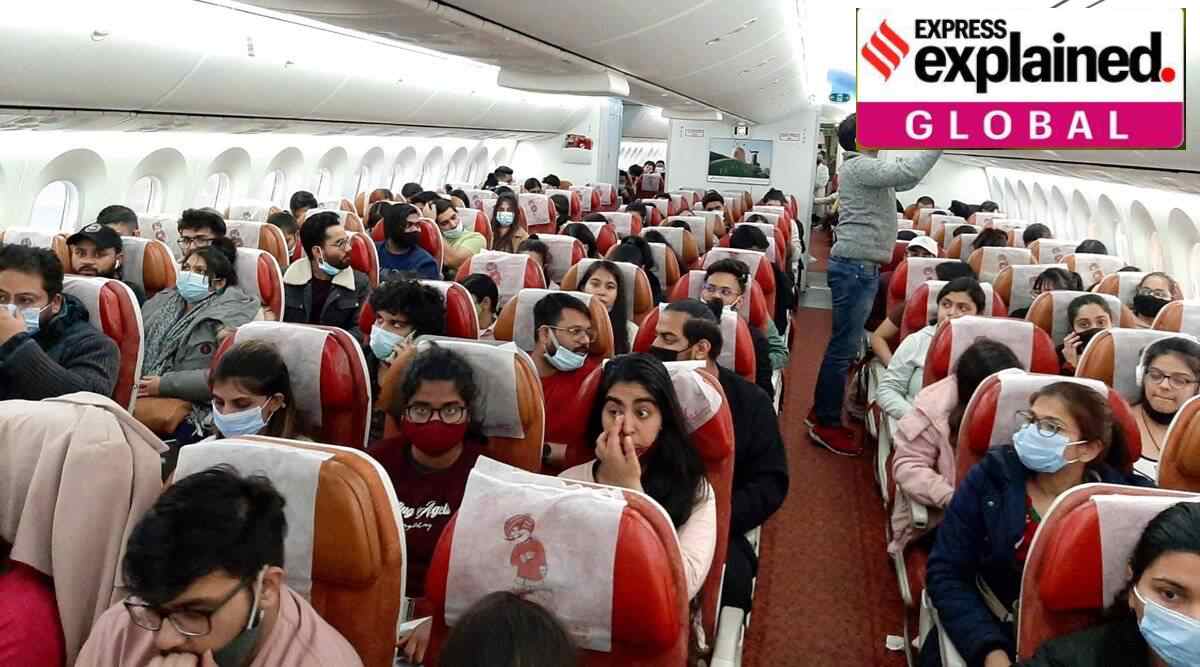Govt’s fresh Ukraine advisory: Why some Indian students returned to war-torn country
Since September, many Indian students have returned to Ukraine to resume their education. What does India's new advisory about Ukraine say?
 In February this year, India evacuated people studying in Ukraine as part of Operation 'Ganga'. (Twitter/@DrSJaishankar)
In February this year, India evacuated people studying in Ukraine as part of Operation 'Ganga'. (Twitter/@DrSJaishankar)In a fresh advisory, India has warned its citizens against travelling to Ukraine and asked students who went back to their colleges in the country to leave, in view of the “deteriorating security situation”.
The advisory, issued on October 19, has once again drawn attention to the popularity of Ukraine, which is locked in a war with Russia, as a study destination for thousands of Indians, who flock there mostly for MBBS degrees.
What does the fresh advisory say?
Issued by the Indian embassy in Ukraine, it states, “In view of the deteriorating security situation and recent escalation of hostilities across Ukraine, Indian nationals are advised against travelling to Ukraine. The Indian citizens, including students, currently in Ukraine are advised to leave Ukraine at the earliest by available means.”
As the conflict escalated in March, New Delhi had to temporarily relocate its embassy in Kyiv, the Ukrainian capital, to neighbouring Poland. It resumed operations on May 17.
What prompted the new advisory?
Since September, many Indian students have returned to Ukraine to resume their education. The advisory seems to be a response to the renewed hostilities between Russia and Ukraine after the October 8 Kerch Bridge attack, which is crucial link route for Russia. In response, Russia signalled that it was gearing up to escalate the offensive by targeting Ukraine’s energy infrastructure and declaring martial law in cities like Kherson, which it has annexed over the course of the nearly eight-month-long war.
How many Indians are in Ukraine currently?
While that could not be ascertained immediately, between February and July, around 22,500 Indian nationals, predominantly medical students, were evacuated from Ukraine. According to data furnished by the Ministry of External Affairs in the Parliament in June 2021, with 18,000 Indian students enrolled in its educational institutions, Ukraine has left countries like Russia (16500) and France (10000) behind.
The Indian government had mounted a massive evacuation operation, codenamed ‘Ganga’ – to bring back the students as Moscow’s aerial attacks and bombings began.
But why did the students return to Ukraine?
After the initial relief of having safely fled a conflict zone, the students landed in uncertainty over the future of their education. Their difficulties increased once the colleges resumed offline classes. The Indian government has on multiple occasions categorically underlined that students who were pursuing medicine degrees inUkraine cannot be accommodated in colleges here.
“There is no such provision in the Indian Medical Council Act, 1956 and the National Medical Commission Act, 2019 as well as the regulations to accommodate of transfer medical students from any foreign medical institutes to Indian medical colleges,” MoS Health Dr Bharti Pravin Pawar had informed the Lok Sabha in a written reply in July 2022.
The Health Ministry also conveyed the same position to the Supreme Court on September 15.
Although the National Medical Commission (NMC) has allowed Indian students to opt for the ‘academic mobility programme’, under which they can complete their education in other countries globally, most are keen on returning, and many have already done so. Factors that seem to be influencing this trend include higher course fee and inferior quality of education in other European countries, among others.
Why is Ukraine popular for Indian medicine aspirants?
Ukraine has over the decades emerged as a popular destination for MBBS aspirants from India for its relatively low cost medical education, easy admission process, and large number of private agents actively scouting for students with various offers.
Ukraine also offers opportunities to enter the larger European market, particularly since it became a part of the Bologna process in 2005, which encourages mutual recognition of degrees and collaboration among European nations in the sphere of higher education.
Not just for Indians, medicine is the overwhelming choice of most foreign students coming to Ukraine to study. Ukraine government data show that of the 80,470 foreign nationals studying there in 2019, 32.26 per cent had signed up for degrees in medicine.
- 01
- 02
- 03
- 04
- 05






































